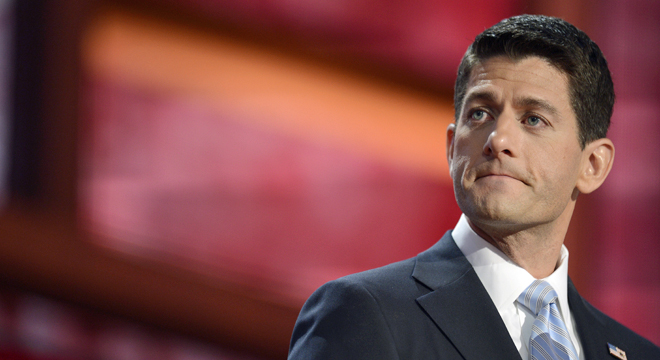House Speaker John Boehner (R-OH) has tapped Rep. Paul Ryan (R-WI) to help reach a deal to avoid the “fiscal cliff,” a senior GOP aide confirms to TPM. The elevated role puts the staunch conservative and recent vice presidential nominee in a tough predicament that carries important implications, both for his personal political future and, potentially, for relations between the White House and Congressional Republicans.
Ryan, the chairman of the House Budget Committee, is now at the center of fiscal cliff talks and involved in daily GOP leadership meetings, along with Ways & Means Chairman Dave Camp and Energy & Commerce Chairman Fred Upton, the aide said. That means that unlike previous hard-fought bipartisan deals, his fingerprints will be on the final outcome.
Now that an agreement on taxes and spending is all but imperative, and since his party lacks the leverage it needs to shape the final legislative package, Ryan must decide whether to use his influence to support a compromise or to push his party to continue opposing any new taxes.
In recent years, Ryan has successfully scuttled bipartisan deficit-reduction deals that contained mixes of tax increases and spending cuts, in service of a more absolutist agenda to remake the federal government in a deeply conservative way. He voted against the Bowles-Simpson deficit reduction report and reportedly played a key role in quashing a $4 trillion debt-cutting deal between Boehner and President Obama in the summer of 2011. Later that fall, he asked not to be named to the super committee tasked with reducing budget deficits by a minimum of $1.2 trillion.
Ryan made those earlier moves with an eye toward 2012: if Republicans were to reject new taxes and small fixes to entitlements, his logic went, it would advance GOP efforts to defeat Obama and give the party a claim to enacting Ryan’s sweeping budget blueprint after the election.
That plan failed, leaving Ryan a few approaches to dealing with his party’s leaders and the White House in ongoing budget negotiations.
One option would be to help broker a compromise and convince rank and file conservatives to accept it. That would provide Ryan the bipartisan credentials he currently lacks, and help him burnish a reputation a results-oriented player during Obama’s second term. But supporting a tax increase, which Democrats will demand in any conceivable deal, would tarnish his sterling right-wing credentials.
Alternatively he could hold the line opposing tax increases, further solidifying his status with the GOP base, but emboldening his detractors’ attacks on him as a conservative ideologue.
Or he could walk a safer line: Keep his hands off any deal that more-senior Republicans cut with Obama, play neither spoiler or kingmaker, mollify all factions by keeping his head down.
A spokesman for Ryan did not return a request for comment on this article.










